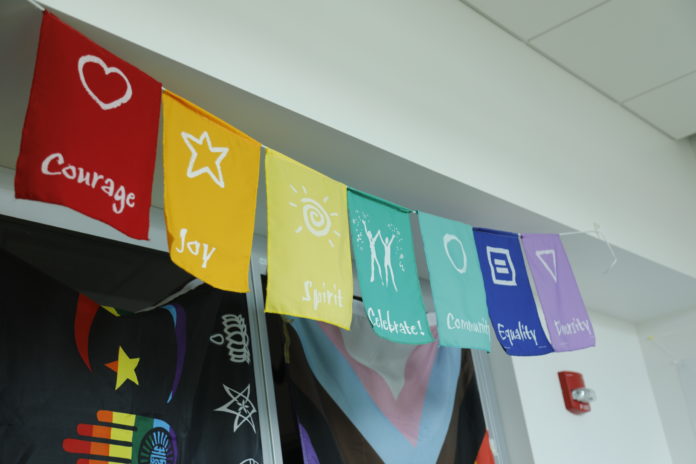CONTENT WARNING: This article contains mentions of suicide and suicidal ideations. Please use caution before reading.
Every day, 22 veterans throughout all branches of the military die by suicide. Every year, 1.8 million LGBTQ youth consider taking their own lives. Seeing these numbers on a page is one thing. For the communities affected, the statistics are all too real, especially during Suicide Awareness Month.
SRU provides support for veterans and the LGBTQ community through designated spaces in the Smith Student Center. The rooms themselves are used for community activities, such as club meetings, or simply relaxing. Active-duty personnel can even access their military work through the Veteran’s Center.
Jared Piccioli, graduate assistant for the Women’s and Pride Center, described the centers’ goals.
“[Our] main purpose is to advocate, educate and empower students on Slippery Rock’s campus of different diverse backgrounds,” Piccioli said.
According to Chris Thrasher, president of Student Veterans of America (SVA), the Veteran’s Center focuses more on relaxation.
“If somebody does need help or is overwhelmed, it’s nice to be able to go someplace where you’re able to relate with everybody there,” Thrasher said. “Somebody in our club knows what you’re going through and can relate.”
Workers at both centers are trained in suicide awareness, and both can connect students with support services. However, almost all of them are outside the center. Thrasher listed Pittsburgh’s Vet Center, the Butler VA and the Veterans Crisis Line before any on-campus resources.
As for the Pride Center, Piccioli listed the Counseling Center and mentioned on-campus support groups. When someone comes in needing support, the first step is to talk to them. Alexandra Chilson, a student worker at the Women’s and Pride Center, discussed the process.
“The first thing that’s going through our mind is ‘What can I do?’ or ‘What are my limitations in terms of helping this individual?’,” Chilson said. “Then, depending on severity and what is actually happening, I look into resources … and I’ll connect them with [what] they need.”
Veterans face a unique challenge when seeking support.
“There’s a stigma around military veterans that seeking help is a sign of weakness, and unfortunately, it carries over no matter where we’re at,” Thrasher explained. “It’s hard for veterans to understand that, before they reach a breaking point, they can ask for help.”
Members of SVA base their responses around Ask, Care, Escort (ACE) cards. Veterans may hear about someone struggling through word of mouth. ACE then starts with checking on the person or responding to them if they ask for help. Care boils down to not leaving the person alone.
“It’s a human life,” Thrasher said. “The student would take over priority for that day until I got them help or guided them to somebody else who could help.”
The last step is escorting the student to the Health Center or another emergency resource. Even after they reach a safe place, Veteran’s Center workers will stay with the person at risk if necessary.
Workers at the Pride Center are mandated reporters.
“If the severity level is high, we do have to create a CARE form,” Piccioli said. “It’s only to those that directly need to be involved. That would be my direct supervisor and the counseling department.”
The Pride Center often collaborates with LGBTQ groups on campus, such as RockOUT, to spread awareness through social events. According to Piccioli, they have plans “in the works” for the rest of the month.
The Veteran’s Center will participate in November’s military and first responders football game through Pie a Hero. Thrasher plans to meet with Karla Fonner, the Dean of Students, to discuss adding more accessible resources for the 400-plus veterans at SRU.
Representatives from both centers said that social media is a vital way to reach out. Chilson pointed out that online outreach is good for both young people and those who want to stay anonymous. Thrasher mentioned commuters, which has a significant overlap with the student veteran population.
“Mental health has become a bigger topic [in the] last 10 years,” Thrasher said. “I think that’s where we have to do better as a collective, to make sure people know that there’s always an option over top of suicide. Always.”
If you or someone you know have thoughts of suicide, there is help available 24/7 at the National Suicide Prevention and Crisis Hotline at 988. You can also text the Crisis Text Line 24/7 by texting TALK to 741-741. For veterans, text 838255 for the Veterans Crisis Line.








